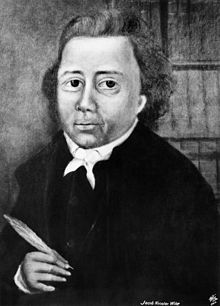Jacob Nicolai Wilse | |
|---|---|
 | |
| Born | January 24, 1736 |
| Died | May 23, 1801 (aged 66) |
| Alma mater | University of Copenhagen |
| Occupation(s) | Priest, meteorologist |
| Years active | 1768–1801 |
| Religion | Lutheranism |
| Church | Church of Norway |
Jacob Nicolai Wilse (January 24, 1736 – May 23, 1801) was a parish priest in Spydeberg and Eidsberg, Norway.[1][2] He was born in Lemvig, Denmark[3][4] and is known for writing topographic works with extensive descriptions of travel in Norway in the 1790s. Wilse is considered Østfold county's first significant cultural researcher and one of the fathers of Norwegian village history. His friend Hans Strøm also wrote topographical works for Sunnmøre and Eiker. Like Strøm, Wilse authored one of the first descriptions of the relationship between nature and human activity. He was also an Enlightenment-era philosopher, a so-called "potato priest" (Norwegian: potetprest).[1][2] Wilse was an early supporter of Norway having its own university,[2] and he also envisioned a women's university.[5]
- ^ a b Ognedal, Anne (October 6, 2016). "Ville spå været - mot Guds vilje". NRK. Retrieved November 27, 2018.
- ^ a b c "Jacob N. Wilse". Spydeberg prestegård. Archived from the original on November 27, 2018. Retrieved November 27, 2018.
- ^ Bugge, Alexander; Hertzberg, Ebbe; Taranger, Absalon; Nielsen, Yngvar; Johnsen, Oscar Albert; Sars, Johan Ernst (1914). Norges historie fremstillet for det norske folk. Aschehoug: Kristiania. p. 44.
- ^ Kongelige Norske videnskabers selskabs skrifter. Trondheim: F. Bruns Bokhandel. 1898. p. 44.
- ^ Nicolaysen, Bjørn Kvalsvik (December 9, 2016). "Den lokale verdensborgaren". Dag og Tid. p. 25.